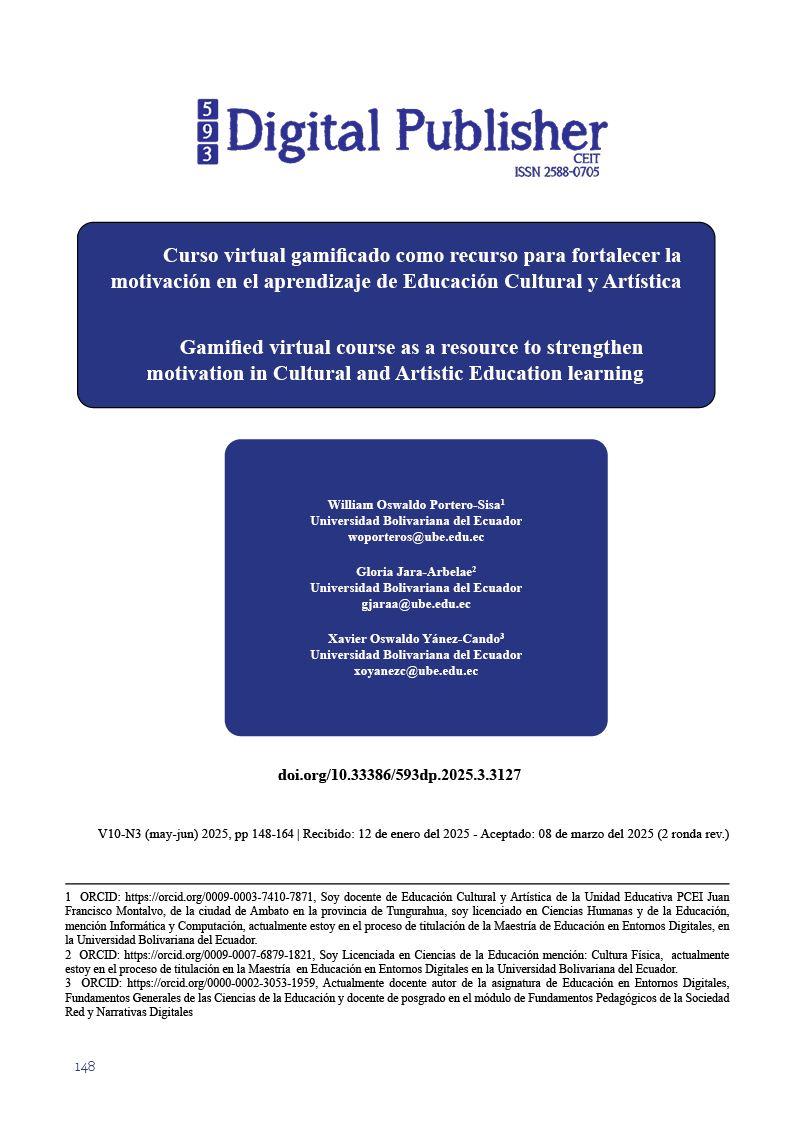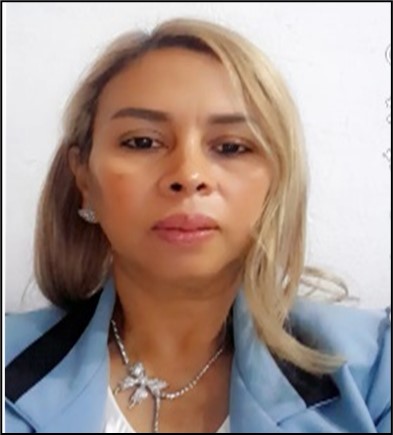Gamified virtual course as a resource to strengthen motivation in learning Cultural and Artistic Education
Main Article Content
Abstract
Gamification is the creation of practical actions to dynamize classes using game-based elements. This study set out to design a gamified virtual course using digital resources available through a Virtual Learning Environment (VLE), in order to improve learning motivation in the subject of Cultural and Artistic Education among high school students. The research adopted a mixed approach, combining quantitative and qualitative methodologies, with a cross-sectional design and a descriptive scope to evaluate the impact of this strategy on the levels of intrinsic motivation and academic performance of tenth grade students in the Basic School Ismael Pérez Pazmiño, located in the district O9D14, circuit 3, parish Sabanillas, canton Pedro Carbo, province of Guayas, Ecuador. Theoretical methods such as historical-logical, inductive-deductive, hypothetical-deductive and analytical-synthetic were used, as well as empirical methods that included documentary analysis, surveys and interviews; mathematical-statistical techniques were applied to perform a descriptive and comparative analysis, together with a pedagogical experiment that evaluated the implementation of the virtual course. The results highlighted the relevance of the Moodle platform and gamification as practical resources to stimulate meaningful learning and develop cognitive skills in students. Gamification was presented as an effective pedagogical strategy that increased motivation and ensured meaningful learning in Cultural and Artistic Education. The implementation of a gamified virtual course, proved to be a powerful tool to improve both their interest and academic performance in this discipline.
Downloads
Article Details

This work is licensed under a Creative Commons Attribution-NonCommercial-ShareAlike 4.0 International License.
1. Derechos de autor
Las obras que se publican en 593 Digital Publisher CEIT están sujetas a los siguientes términos:
1.1. 593 Digital Publisher CEIT, conserva los derechos patrimoniales (copyright) de las obras publicadas, favorece y permite la reutilización de las mismas bajo la licencia Licencia Creative Commons 4.0 de Reconocimiento-NoComercial-CompartirIgual 4.0, por lo cual se pueden copiar, usar, difundir, transmitir y exponer públicamente, siempre que:
1.1.a. Se cite la autoría y fuente original de su publicación (revista, editorial, URL).
1.1.b. No se usen para fines comerciales u onerosos.
1.1.c. Se mencione la existencia y especificaciones de esta licencia de uso.
References
Acedo, W., Rosas, A., & Villasmil, M. (2022). La gamificación como herramienta de aprendizaje en los estudiantes de la primera etapa. Revista Electrónica de Estudios Telemáticos, 21(2), 16-27.
Consuegra Cheng, M. M., Utrera Alonso, M., & Herrera González, D. (2022). La enseñanza artística: Componente esencial para el conocimiento de la Historia. Revista Científica Cultura, Comunicación y Desarrollo, 7(3), 77-82.
Córdoba Castrillón, M. M., & Ospina Moreno, J. (2019). Los videojuegos en el proceso de aprendizaje de los niños de preescolar. Revista Interamericana de Investigación, Educación y Pedagogía, 12(2), 113-138. https://doi.org/10.15332/25005421.5010
González Castro, J. C. A., Corrales Félix, G. L., & Morquecho Sánchez, R. (2023). La motivación en el proceso de enseñanza-aprendizaje. Ciencia Latina Revista Científica Multidisciplinar, 7(1), 3922-3938. https://doi.org/10.37811/cl_rcm.v7i1.4708
Gordillo Mera, S., Washima Zhunio, M., & Enrriquez Jaya, I. (2020). Estrategias metodológicas de enseñanza- aprendizaje en Educación Cultural y Artística para el desempeño docente de educadores en formación. Revista Electrónica REEA, II(5), 202-219.
Grand Clement, S. (2017). Digital learning Education and skills in the digital age. RAND Europa, 23. https:// e r i c . e d . g o v / ? i d = E D 5 9 1 3 6 4
Hernández-Sampieri, R., & Mendoza, C. (2018). Metodología de la investigación. Las rutas cuantitativa, cualitativa y mixta. Mc Graw Hill Education. https://www.google.com/url?sa=t&source=web&rct=j&opi=89978449&url=https://virtual.cuautitlan.unam.mx/rudics/wp-content/uploads/2019/02/RUDICSv9n18p92_95.pdf&ved=2ahUKEwjf7NHXu5OKAxX-RTABHTgcFocQFnoECBsQAQ&usg=AOvVaw2MUmYvahgsxjAj_bFL6lFX
Justiniano Flores, R. J., & Cancino Cotrina, D. M. (2024). La motivación en el aprendizaje durante la última década. Horizontes. Revista De Investigación En Ciencias De La Educación, 8(32), 380-392. https://doi.org/10.33996/revistahorizontes.v8i32.730
Maldonado Zuñiga, K., Cables Fernández, E. A., & Rodríguez Sinisterra, G. M. (2024). Gamificación: Una técnica innovadora de aprendizaje en el ámbito educativo-profesional. 20(2). https://www.google.com/url?sa=t&source=web&rct=j&opi=89978449&url=https://revistas.udg.co.cu/index.php/roca/article/download/4399/10667/22712&ved=2ahUKEwiExoeuv5iKAxXap7AFHWNcMiwQFnoECDEQAQ&usg=AOvVaw1Wp7GooZQnOF0yHDv6ru6z
Martínez Paz, D., & Toscano Menocal, Anamarys. (2021). La gamificación para la formación del profesional en ciencias de la información mediante las tecnologías de la información y la comunicación. Conrado, 17(81), 7-16.
Monserrate Franco-Segovia, Á. (2023). Importancia de la gamificación en el proceso de enseñanza-aprendizaje. Polo del Conocimiento, 8(8), 844-852. https://doi.org/10.23857/pc.v8i8
Pástor, D., Jiménez, J., Arcos, G., Romero, María, & Urquizo, L. (2018). Patrones de diseño para la construcción de cursos on-line en un entorno virtual de aprendizaje. Ingeniare. Revista chilena de ingeniería, 26(1), 157-171. https://dx.doi.org/10.4067/S0718-33052018000100157
Ramírez-Caraguay, A., Bastidas-Alava, A., & Ordoñez-Vivero, R. (2024). Herramienta de gamificación Quizizz en el rendimiento académico del estudiante de bachillerato. 593 Digital Publisher CEIT, 9(5), 749-764. https://doi.org/10.33386/593dp.2024.5.2679
Recio Mayorga, J., Prudencia Gutiérrez, E., & Suárez Guerrero, C. (2021). Recursos educativos abiertos en comunidades virtuales docentes. Apertura, 13(1), 101-117.
Rodríguez Vizuete, J. D., Arroyo, D., García Caicedo, S. S., & Boné Andrade, M. F. (2023). Gamificación como estrategia innovadora en la enseñanza de Tecnologías de la Información y Comunicación. bero-American Journal of Education & Society Research, 3(1). https://doi.org/10.56183/iberoeds.v3i1.599
Salido López, P. V. (2021). La Educación Artística ante el reto de enseñar a aprender: Un estudio de caso en la formación de docentes. Arte, individuo y sociedad, 33(4), 1429-1447. https://doi.org/10.5209/aris.72439
Santander Salmon, E., & Schreiber Parra, M. J. (2022). Importancia de la motivación en el proceso de aprendizaje. Ciencia Latina Revista Científica Multidisciplinar, 6(5), 4095-4106. https://doi.org/10.37811/cl_rcm.v6i5.3378
Soledispa Rivera, A. M., San Andrés Soledispa, E. J., & Soledispa Pin, R. A. (2020). Motivación y su influencia en el desempeño académico de los estudiantes de educación básica superior: Motivación de los estudiantes. Revista Científica Sinapsis, 3(18). https://doi.org/10.37117/s.v3i18.431
Vera-Mora, G., Sanz, C. V., Coma-Roselló, T., & Baldassarri, Sandra. (2022). Entornos virtuales de enseñanza y aprendizaje gamificados a la luz del concepto de presencia: Revisión sistemática de literatura. Revisión sistemática de literatura. Revista Iberoamericana de Tecnología en Educación y Educación en Tecnología, 33, 25-35. https://dx.doi.org/https://doi.org/10.24215/18509959.33.e3
Zambrano-Álava, A. P., Lucas-Zambrano, M. D. L. Á., Luque-Alcívar, K. E., & Lucas-Zambrano, A. T. (2020). La Gamificación: Herramientas innovadoras para promover el aprendizaje autorregulado. Dominio de la Ciencia, 6(3), 349-369. http://dx.doi.org/10.23857/dc.v6i3.1402




